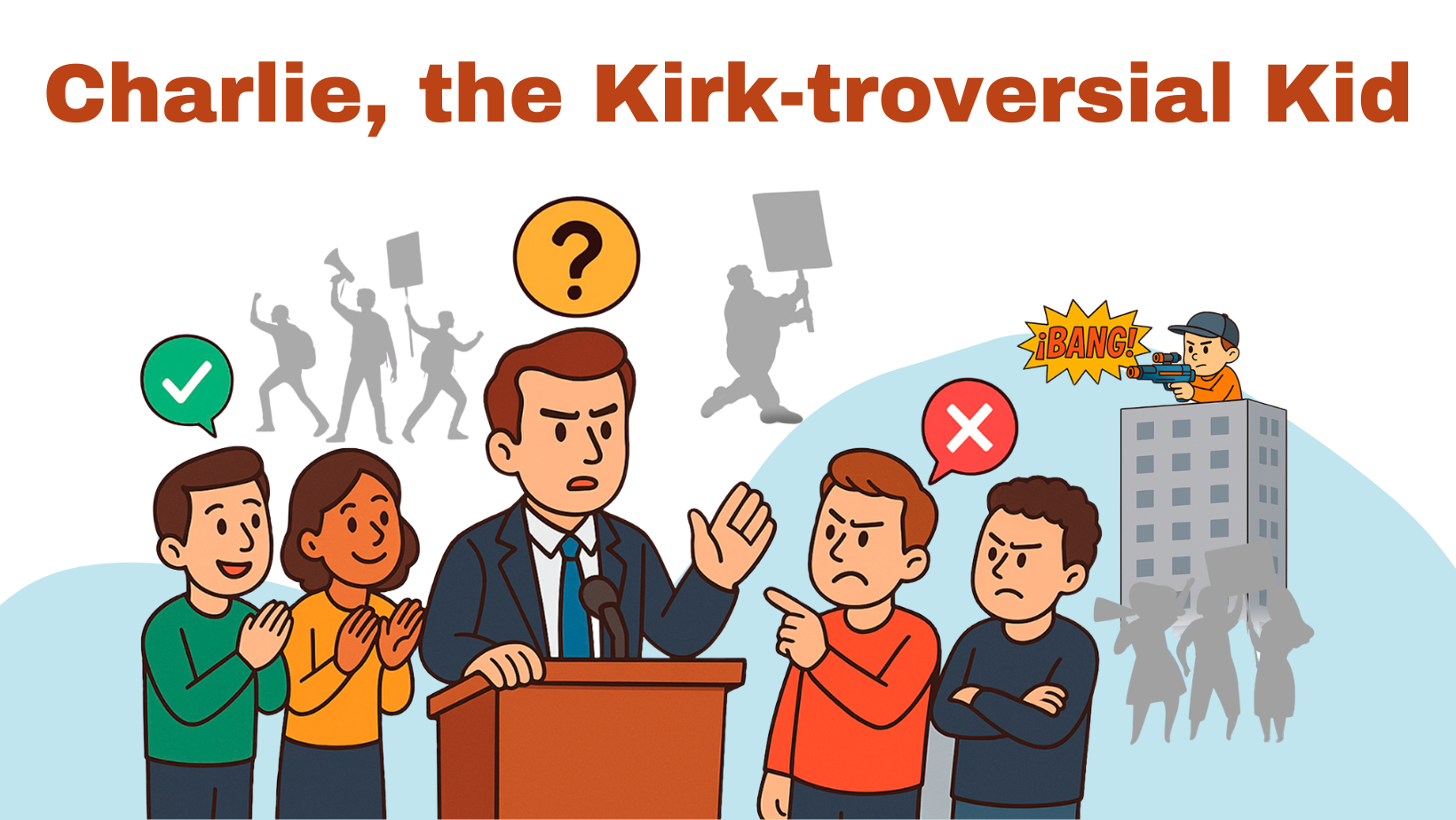
Charlie Kirk Was Never Boring!
Love him or hate him, you couldn’t scroll past him. He was the walking embodiment of the American comment section — caffeinated, suited up, and always ready to drop a hot take that would blow up your group chat. Founder of Turning Point USA (TPUSA), podcaster, professional provocateur, and a guy who could turn a campus protest into free PR overnight, Kirk made a career out of trolling the left, energizing the right, and keeping his name trending.
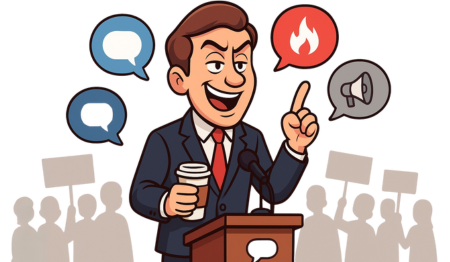
Boring Obituary? Not Here!
Forget the polite, sanitized summaries. This isn’t that. This is a deep, messy, no-filter dive into Kirk’s rise, his ideas, his scandals, his last viral post — and yes, the shocking way it all ended. Shot dead at 31, during a live event at Utah Valley University, Kirk’s final headline turned him into the center of one last nationwide firestorm.
If Kirk turned politics into entertainment, this is the season finale.
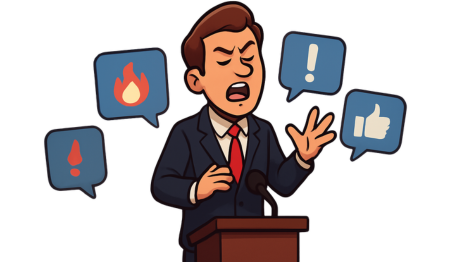
Origins of a Culture Warrior
Kirk’s story starts like a pretty typical suburban tale: born October 14, 1993, in Arlington Heights, Illinois. His dad was an architect, his mom stayed at home, and young Charlie had a taste for arguments early. He joined JROTC in high school, where he learned discipline, leadership, and probably how to make a bed that could pass a military inspection. But it wasn’t just about discipline — it was about developing a worldview that mixed patriotism, order, and an instinct for rallying others.
His big break came at 18, when he published an article for Breitbart accusing American universities of being leftist indoctrination factories. That piece earned him a speaking slot at the 2012 Republican National Convention. Picture this: most teens that age are decorating dorm rooms; Kirk was pitching himself as the future of the conservative movement.
He was accepted to Baylor University but decided not to go — a choice he later turned into a philosophy. In his book The College Scam, he argued higher education was a trillion-dollar trap, leaving students in debt and without real-world skills. Skipping college became his brand — proof that you could “own the libs” without paying tuition.

Turning Point: Building a Campus Empire
Armed with a laptop, borrowed couches, and a chip on his shoulder, Kirk launched Turning Point USA in 2012. At first, it was just him hustling — driving cross-country, speaking to whoever would listen, pitching donors. Soon, major conservative funders like Foster Friess and the Koch brothers saw potential. The shoestring project became a multimillion-dollar operation.
Today, TPUSA is everywhere:
- 2,000+ campus chapters nationwide, giving it a massive presence in student politics.
- Viral content operations that pump out short videos, memes, and TikToks designed to hit outrage algorithms perfectly.
- Annual mega-conferences like AmericaFest and the Student Action Summit, featuring Donald Trump Jr., Tucker Carlson, Candace Owens, and other conservative stars.
- Professor Watchlist, a database that names professors accused of spreading left-wing ideology — praised by some as transparency, condemned by others as harassment.
- Turning Point Faith to mobilize churches and religious groups, and Turning Point Action to train students to work directly on campaigns.
TPUSA made conservatism look like a lifestyle brand. These events weren’t your dad’s Republican mixers. They looked more like music festivals: light shows, merch stands, influencer photo ops, live podcast tapings, and enough fireworks to make Coachella jealous.
For young Republicans, Kirk turned politics into a party — and they showed up.

The Kirk Doctrine: Controversy as Strategy
Kirk thrived on outrage. He didn’t just respond to culture war topics — he manufactured viral moments. Some of his most controversial stances included:
- Immigration: Build the wall, deport undocumented immigrants, shut down sanctuary cities and stop “importing voters.”
- Multiculturalism: Called it “a slow erasure of America’s core identity.” Claimed it weakens American identity and “erodes the values that built the country.”
- Feminism: Claimed modern feminism “turned masculinity into a disease.”
- Education: Called universities “indoctrination camps” and accused schools of “brainwashing kids” with Critical Race Theory.
- COVID-19: Opposed lockdowns, mask mandates, and vaccine requirements, calling them “tyranny dressed up as science.”
- Elections 2020: Amplified “Stop the Steal” and organized busloads of students to D.C.
- Climate Change: Mocked environmentalism as “green tyranny.” Called green policies economic suicide and “an excuse to take your truck and make you eat bugs.”
- Black Lives Matter: Called it a “radical movement” that fuels racial division and “hates the nuclear family.”
But perhaps his most nuclear takes were about race and diversity programs. He once said:
- “If I see a Black pilot, I think: ‘I hope he’s actually qualified.’” — in a rant about DEI in airlines.
- “If you’re a Black lesbian WNBA player who smokes weed, you get treated better than a U.S. Marine.”
- About Michelle Obama and Justice Ketanji Brown Jackson: “You don’t have the brain processing power to be taken seriously.”
His defenders called him brave. His critics called him a bigot with a podcast.
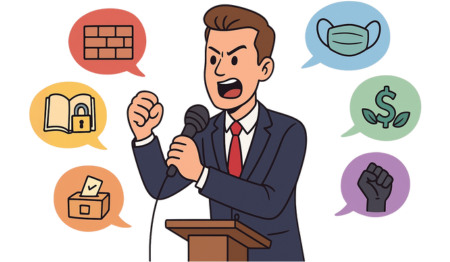
MAGA’s Chief Evangelist
Kirk wasn’t just a supporter of Trump — he was one of MAGA’s chief evangelists.
Through TPUSA Action, he turned students into campaign volunteers and rally-goers. After the 2020 election, he leaned hard into election fraud claims, amplifying the “Stop the Steal” narrative and boasting about sending more than 80 buses of students to Washington, D.C. on January 6, 2021.
After the riot turned violent, he condemned the chaos but refused to apologize for the mobilization. “We wanted a peaceful protest,” he insisted — but many saw him as one of the influencers who helped set the stage.
Kirk increasingly blended religion with politics, quoting scripture and framing the culture war as spiritual warfare. This electrified his Christian base but alienated moderates, making him both more powerful and more polarizing.

His Final Post
Just hours before his assassination, Kirk posted about the murder of Iryna Zarutska, a 22-year-old Ukrainian immigrant killed on a Chicago train:
“If we want things to change, it’s 100% necessary to politicize the senseless murder of Iryna Zarutska because it was politics that allowed a brutal monster with 14 priors to be free on the streets to kill her.”
When police revealed the killer was DeCarlos Brown, a Black man with untreated mental illness, critics accused Kirk of racializing the tragedy and spreading misinformation. Supporters said he was exposing systemic failures that led to the murder. It was classic Kirk: drop a grenade into the discourse and watch the explosion.

“I Got That White Girl”
Turns out, it was DeCarlos Brown, a Black man with a long record of mental illness who had repeatedly sought psychiatric help but was released each time. Critics accused Kirk of racializing the tragedy and spreading misinformation by claiming the attacker said, “I got that white girl” — a statement for which no public evidence has been released.
His supporters argued he was exposing a broken justice system.
Either way, it was classic Kirk — take a tragedy, turn it into a political talking point, and watch the internet explode.
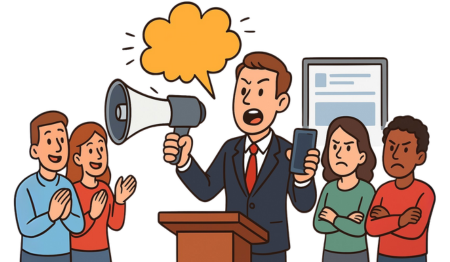
The UVU Shooting
September 10, 2025: Utah Valley University. Kirk is mid-speech when a single shot cracks from a nearby rooftop. Chaos erupts. He’s rushed to the hospital, but within the hour, he’s pronounced dead.
The shooter: Tyler Robinson, 22, an electrical trade student. His own father spotted him on FBI footage and convinced him to surrender. At his house, police found a bolt-action rifle, a scope, and bullet casings engraved with taunts like “Hey fascist, catch this!” and “Bella ciao.”
Robinson wasn’t just some random kid — friends say he’d been radicalizing online for months, posting anti-establishment memes and diving into endless culture-war debates on Discord.
Now investigators are trying to figure out: was this an ideological hit, a mental health spiral, or both? Either way, the political spin machine went into overdrive the second the news broke.
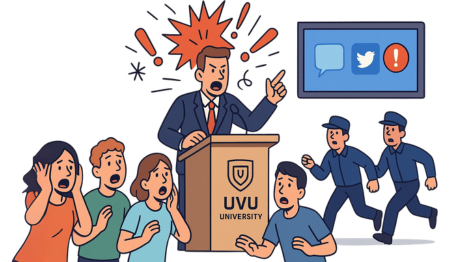
Who Was Tyler Robinson?
Robinson grew up in southern Utah, the oldest of three siblings. Quiet, smart, the kind of kid who’d spend hours gaming and tinkering with electronics. He was studying to be an electrician at Dixie Technical College, but classmates say he’d grown more withdrawn in recent months.
He could have been wiring a kitchen this semester. Instead, he was wiring together an assassination plot.
Investigators uncovered encrypted chats where Robinson talked about feeling “called to do something big” and even mentioned Kirk by name in the days leading up to the attack.

Raised Red, Shooting Red
No manifesto has turned up, but the bullet casings — engraved with anti-fascist slogans and memes — point to a cocktail of dark humor, political rage, and mental instability. His parents reportedly begged him to surrender, fearing he’d take his own life before being caught.
His parents, lifelong Republicans and devout Christians, had raised him on church potlucks and Fox News — which only made it darker that their son would one day kill a conservative star.

Love, Memes, and Murder
One of the stranger twists in the case came from Robinson’s personal life: he lived with — and was in a relationship with — a trans woman. Al Jazeera published parts of their encrypted chats, where Robinson hinted at “doing something big” and joked about “going viral.”
Her response was a mix of concern and gallows humor: “Please don’t actually do something foolish. I like you alive.”
Authorities say she’s cooperating fully and was “shocked” by the shooting — but that hasn’t stopped the internet from using the relationship as political ammo. Far-right influencers call Robinson a “radical leftist,” while others say this was less politics, more pathology: a mentally unwell young man getting lost in the algorithm.
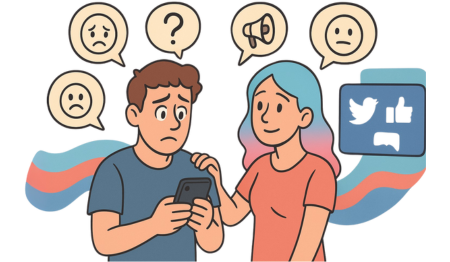
DMs and Dead Ends
The investigation took a stranger turn when prosecutors released encrypted chat logs between Robinson and his girlfriend — a trans woman who is now cooperating with police.
In the messages, Robinson didn’t mince words:
“I had enough of his hatred … Some hate can’t be negotiated out.”
The chats reveal a man spiraling — blending internet slang, black humor, and step-by-step instructions to look “under [his] keyboard” for a note admitting the plan. Prosecutors say those digital receipts are a confession in real time.
But the logs also complicate the story. Was this cold political revenge? A psychotic break? Or just a terminally-online kid acting out the worst version of his ideology? Either way, the internet did what the internet does — screenshots are now memes, TikToks are set to sad music, and both sides are claiming it proves exactly what they already believed.

💌 “Look Under My Keyboard”
— The Chilling Note That Changed Everything—But, what else did the text messages reveal?
On the day of the shooting, Robinson texted his flatmate and partner, telling her to:
“Drop what you’re doing, look under my keyboard.”
When the flatmate did, she found a handwritten note:
“I had the opportunity to take out Charlie Kirk and I’m going to take it.”
After reading the note, the flatmate texted Robinson back:
“What????????????? You’re joking, right????”
Then came the exchange:
- Robinson: “I am still ok my love, but am stuck in Orem for a little while longer yet. Shouldn’t be long until I can come home, but I gotta grab my rifle still. To be honest I had hoped to keep this secret till I died of old age. I am sorry to involve you.”
- Flatmate: “you weren’t the one who did it right????”
- Robinson: “I am, I’m sorry”
And just like that, the rumor became a confession.someone says “no pasa nada” they might actually mean “everything is on fire but we’re chill about it.”
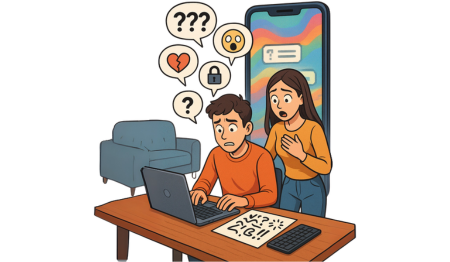
🏹 The Trigger That Set Him Off
Just days before the shooting, Kirk had doubled down on one of his most controversial talking points — that transgender people should be barred from owning firearms. To many, it was just another Kirk hot take designed to rile up his base—but to Robinson, who was living with a trans woman, it read like a personal attack.
Leaked chat logs show Robinson ranting about the comments, calling Kirk “dangerous” and accusing him of “pushing people like [his partner] out of society.” Friends say he was furious, pacing and doomscrolling for hours.
Was this the final straw?
- For some, Kirk’s rhetoric is free speech — provocative, sure, but protected.
- For Robinson, it may have been a call to action.
Whether it was ideology, mental illness, or a toxic mix of both, this was the moment his anger stopped being abstract — and became a plan.
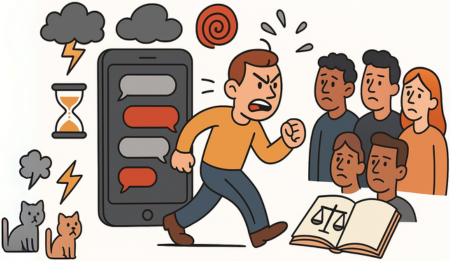
🎯 Robinson: Radical or Just Angry?
Robinson’s life reads like a case study in 21st-century political disillusionment. Raised in a red-state, red-meat household, he once voted Republican. But after watching Kirk’s relentless attacks on trans people — including calls to ban them from sports, public bathrooms, and even certain professions — something snapped.
Was it ideology? Mental illness? A personal vendetta? Maybe all three.
That’s the question now dividing America:
- The Right: Calls him a left-wing terrorist and uses his crime as proof that “wokeness” breeds violence.
- The Left: Sees him as a symptom of radicalization-by-outrage — someone pushed over the edge by years of incendiary rhetoric.
Would a “normal” person kill over this? Maybe yes, maybe no. But Robinson wasn’t trying to be normal — he was trying to make a point, and he chose a bullet instead of a tweet.
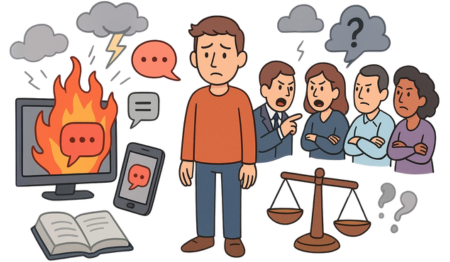
🎯 The Culture War Spin
Almost instantly, the shooting became ammo for both sides.
- Conservatives: used Robinson’s relationship with a trans woman as “proof” that trans people are unstable and dangerous — a take that felt uncomfortably close to Kirk’s own rhetoric.
- Progressives: pointed to Kirk’s comments about banning trans gun owners as the kind of speech that radicalizes unstable people.
The Truth?
Robinson wasn’t a walking thinkpiece — he was a messy human being. Angry, online, spiraling.
His actions don’t prove a political point about trans people any more than a Proud Boy brawl proves that all conservatives are violent.
But that’s the internet for you: everyone thinks they just won the argument.
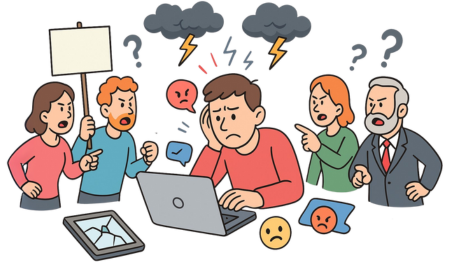
Political and Media Reactions
The shooting set off a political earthquake. Donald Trump called Kirk “a martyr for free speech” and demanded the death penalty for Robinson. Right-wing media turned the event into a rallying cry against “left-wing violence.” Progressive outlets took a more nuanced approach, pointing to the dangers of radicalization across the spectrum and calling for de-escalation of political rhetoric.
Fox News ran non-stop tributes, while CNN panels debated whether Kirk’s own combative style contributed to the hostility. Social media became a battleground, with #RIPCharlieKirk trending alongside memes mocking his past statements — proof that even in death, Kirk polarized America.
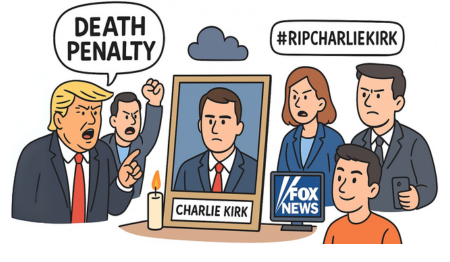
The Gun Debate — Reopened
Kirk was a Second Amendment absolutist. “Freedom is dangerous — and that’s the point,” he often said. His murder reignited the debate: does unlimited gun access protect freedom, or does it make tragedies like this inevitable? Even some conservatives quietly wondered if the “good guy with a gun” narrative holds when the bullets are aimed at your leaders.

Global Context
Kirk was part of a global trend of right-wing influencers: Giorgia Meloni, Vox in Spain, Javier Milei in Argentina. All of them weaponize virality, memes, and provocation to turn politics into a movement that feels more like fandom.

Legacy and Big Questions
Charlie Kirk turned politics into performance art. Whether you think he was a truth-teller, a troll, or a dangerous demagogue, his influence is undeniable. His death leaves a hole in the conservative youth movement and raises questions about whether TPUSA can survive without him — or if it will canonize him as a martyr and double down.
Even in death, Kirk is still making people argue. Maybe that’s exactly how he would’ve wanted it.

